|
– Part 2: The Films (1935-1943) –
| |
“For one kiss of your lips I would give half of my life.”
“Oh, see me tomorrow, I'll kiss you twice.” |
| Cleo responds to Ivan Valadov’s wooing |
Almost from the moment she makes her first appearance in Goin’ to Town, Mae West seems to have bounced back from the Hays Office-enforced stumble of her previous film and reignited the persona that launched her to stardom in the first place. Here she plays dance hall queen, Cleo Borden, and she’s back to flirting with two men at a time whilst keeping a watchful eye out for a third. As the film begins, she’s in a balcony room snogging a man who is credited on the film only as ‘Young Fellow’ (Grant Withers), but when wealthy rancher and part-time cattle rustler Buck Gonzales (Fred Kohler) arrives and demands to see her, she gives the other guy the heave-ho and trots downstairs slips straight into Buck’s arms. He wants to marry Cleo immediately, and while she happily accepts, she claims to need a couple of weeks to prepare an appropriate wedding. The night before the big day, however, Buck is killed by lawmen whilst rustling cattle, but it turns out that just accepting his proposal is enough to qualify Cleo to inherit all of his property and worldly goods, which instantly makes her one of the richest women in the state.
The first thing she does is offer Buck’s accountant Winslow (Gilbert Emery) a lucrative full-time job, and once installed in her new position, she takes an instant liking to Edward Carrington (Paul Cavanagh), the good-looking Englishman who manages the property’s oil wells, but her initial attempt to seduce him is scuppered by a careless remark at his expense. A short while later, Winslow reveals that Edward is now heading to Buenos Aires, and Cleo decides to follow him and enter the estate’s fastest horse in the city’s internationally famous sweepstake race. She also decides that she needs to reinvent herself as a society woman, a plan that sees her hook up with Russian aristocrat Ivan Valadov (Ivan Lebedeff) and to eventually embark on a sham marriage with well-connected but luckless gambler Fletcher Colton (Monroe Owsley), the hope being that this will buy her the social status she believes she needs to win Edward over.
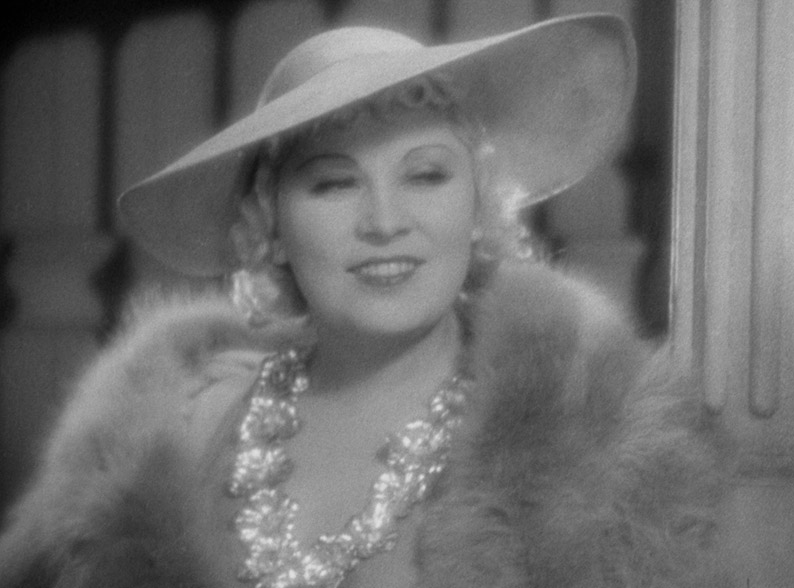
Watching Goin’ to Town just a day after being disappointed by Belle of the Nineties really lifted me up, as it felt like West had taken stock of the new restrictions being imposed on her and recharged her wit. Line after line here is quotable here, and while the sexual innuendos are more subtle, they’re not hard to spot and presumably flew under the radar of the Production Code censors. Seemingly aware that she would no longer be allowed to push the entendre envelope to the same degree was able in her pre-Code films, West expands the scope of her witticisms here to include a wider range of amusing put-downs and game-playing with everyday speech. These are not confined to single-line zingers, as evidenced in one of my favourite insults in the film, when Cleo questions the intelligence of the aristocratic Ivan.
| Cleo: |
Listen, I-van, you're all right to play around with, but as a husband you'll get in my hair. |
| Ivan: |
But, darling...! |
| Cleo: |
Besides, we're intellectual opposites. |
| Ivan: |
What do you mean? |
| Cleo: |
Well, I'm intellectual and you're opposite. |
| Ivan: |
Let me tell you – I'm an aristocrat and the backbone of my family. |
| Cleo: |
Well, your family ought to see a chiropractor. |
There’s also a little more plot here than in the previous films and a wider range of locations, which distances it a little further from the films that West adapted from her own stage plays. The supporting characters are rather fun, from the scheming Russians to the bitchy society women, and director Alexander Hall – whose struck gold in 1941 with Here Comes Mr. Jordan – handles the action with considerable aplomb, including a horse race that’s as thrillingly shot and edited as any I’ve seen (props to cinematographer Karl Struss and editor LeRoy Stone). Sure, it’s not as daring or as sassy as West’s breakthrough films, but it’s a smarter and funnier film than Belle of the Nineties had led me to expect, which left me slightly ill-prepared for…
| |
| "When caught between two evils, I generally like to take the one I never tried." |
| Rose Carlton, aka The Frisco Doll |
If you’re looking for evidence of how the Mae West persona was impacted by the restrictions of the Hays Code and how West still seemed able to slip elements that were on the Code’s hitlist past its enforcers, look no further than Klondike Annie. Here she plays Rose Carlton, otherwise known as The Frisco Doll, and as the film begins, she’s working as a singer in a Chinatown club owned by a wealthy and powerful Chinese gangster named Chan Lo (Caucasian actor Harold Huber in yellowface makeup), and the speculation amongst the clientele is that they might be secretly married. And that, ladies and gentleman, would have been a no-no for the Production Code, which forbade any hint of miscegenation, which for those as new to the word as I was means interracial breeding. Tolerant lot, weren’t they? Chan certainly dotes on Rose but she’s become fed up with being effectively held prisoner for the past year, a situation that has a whiff of white slavery about it, which is number 5 on the Production Code list of forbidden topics, just before the one about miscegenation. It turns out that Rose has already made plans to quietly hop it, plans that a select few friendly Chinese club workers are in on and are quietly assisting with. She agrees to take her loyal maid Fah Wong (Soo Yong) with her, but when a secret message from a Caucasian male friend is intercepted, another of Rose’s female conspirators is captured and tortured for information, a sequence whose horror is conveyed entirely by the sound of poor woman’s screams. Rose escapes anyway and boards a ship run by perennially raging captain, Bull Brackett (Victor McLaglen), whose anger melts away the moment he lays eyes on Rose, and who he becomes determined to woo over the course of the journey.
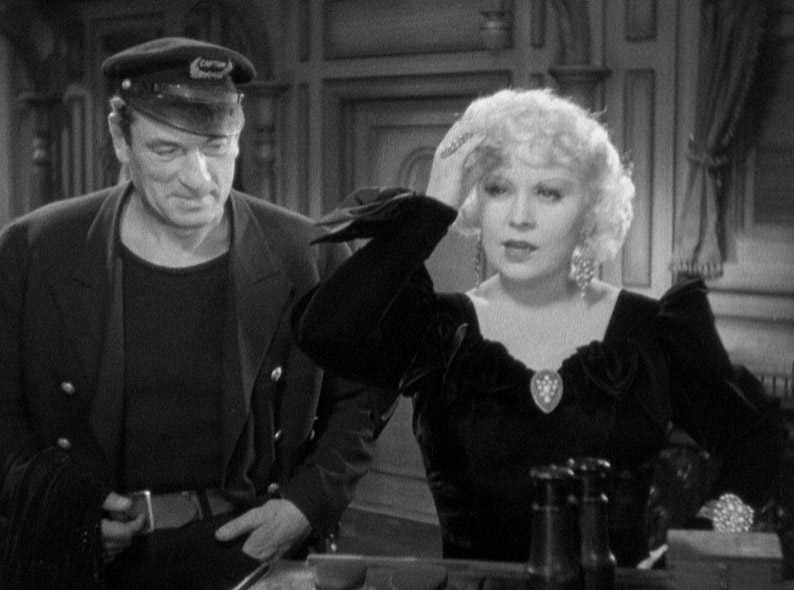
It sounds like a typical Mae West setup and in many ways it is, and while it lacks the wit and spark of Goin’ to Town, it’s engaging enough fare, not least for the typically friendly relationship Rose has with Fah. At one point, the two even converse in (untranslated) Mandarin about the captain whilst in his earshot, a coded way of sharing information without alerting others to their plans. But it’s once Fah leaves the ship and Rose is joined by pious Salvation Army-style missionary, Sister Annie Alden (Helen Jerome Eddy), that we move into what was new territory for West. Although initially the two are engagingly mismatched opposites, Sister Annie pressures Rose into reading the film’s stand-in for the Bible (sidestepping another possible point of Hays Office contention?) then is taken critically ill. The film then gets serious as Rose tends to Annie in her dying moments, and admits to having enjoyed reading the book that Annie now insists she keeps in the hope that it will help keep her on the path of righteousness. Uh-oh.
Both Rose and Annie were heading to the Alaskan city of Nome for different reasons, Ruth drawn by the lure of getting rich in the Gold Rush, and Annie to save the souls of the prospectors. But it turns out that Rose is also running from the law, wanted for the murder of Chan Lo. I’m sorry, what? When did that happen? The first we hear of it is when Bull receives a wanted poster bearing Rose’s name and confronts her about it. As he expresses his outrage at being hoodwinked into transporting a murderer, I waited for Rose’s shocked reaction to what was clearly a frame-up or a mistake, but she remains strangely calm, eventually straightening out the screwed-up poster and looking it over, but showing no trace of surprise or concern. She even takes time to light up a cigarette before challenging Bull with, “Well, what are you gonna do about it?” Wait, so she did kill Chan? Why are we only learning about this now? It turns out that a scene in which the deed in question was done was indeed scripted and filmed, but was one of two significant cuts enforced by you-know-who. The second comes when the Nome police board the ship looking for Rose, and Rose passes herself off as Sister Annie. In the version we see, she and Bull convince investigating officer, Inspector Jack Forrest (Phillip Reed), that the now deceased Annie is The Frisco Doll. Apparently, the deleted footage showed Rose applying makeup to the dead Annie’s face so that she more closely resembled the women they were looking for, which was a step too ghoulish for the moral guardians.
It’s when Rose-as-Annie meets the other members of this religious chapter that the influence of the Hays Office is nigh-on impossible to ignore. This was again written by West, based on her own play and a story by Marion Morgan and George B. Dowell, with additional material ‘suggested by’ Frank Mitchell Dazey, so I have to assume that she was okay with what follows. Yet as Rose starts preaching in her own way to the prospectors, I did sometimes wonder if West was being held hostage by Hays Office goons and forced to dance to their tune the same way Rose was by Lo Chan at the start of the movie. The thrust of the story thus becomes how a woman of suspect morals gets religion and learns to lead a more righteous life. Are you sure this is a Mae West movie?
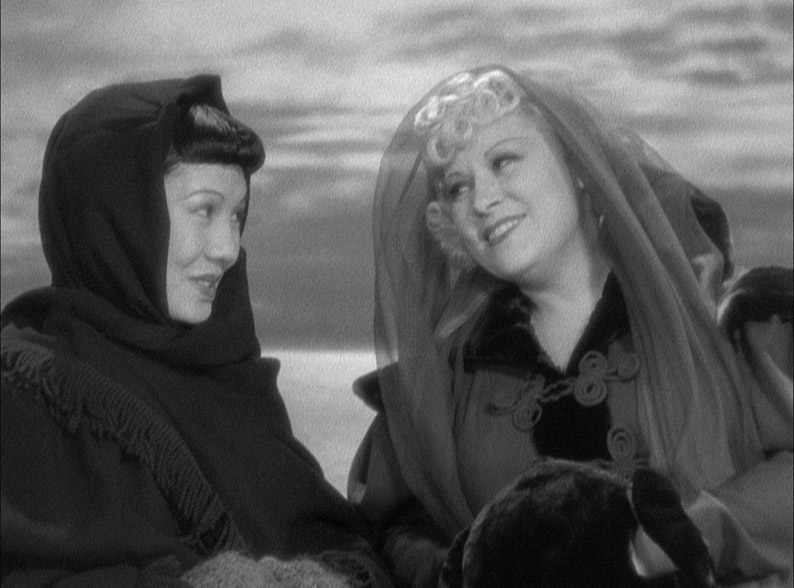
Within this discomfortingly moralist fable, however, there are a few points of interest. It’s almost inevitable that Inspector Jack will quickly fall for Rose, given that almost every man who gets within spitting distance of her does likewise, but I’m surprised that the Hays mob didn’t object to the fact that he is believes she’s a sister of the church when he does so, or that he’s willing to throw away his career to help her flee justice when he learns the truth. The scene in which Rose temporarily drops her Sister Annie act to put the local brothel madam (who’s never identified as such, of course) straight on how things are going to be on Sundays from now on, meanwhile, has echoes in a good many later films. The one that sprang most immediately to mind is the scene in Witness where Harrison Ford’s cop sorts out hoodlums who are mocking the Amish group he is working undercover as part of. And while I’m not often one for comedy relief characters, the character known only by his nickname of Limey (I’ve been unable to confirm who he’s played by, but I think it’s John Rogers) is a low-key delight as the wiry cockney seaman who is the constant target of Bull’s anger and irritation.
Overall, Klondike Annie is an odd film for West, one whose content and narrative flow were clearly impacted by the censorious hand of the Hay Office. It’s solidly directed by Raoul Walsh, the man behind the likes of The Roaring Twenties, High Sierra and White Heat, but is handicapped a little by the forced removal of scenes and the impact this has on narrative clarity. West does get the chance to show that she could handle a serious dramatic scene when required to do so, and does manage to slip in a few small under-the-radar digs, but this still feels a little too like forced capitulation to a Code that by this point really had her in its sights.
| |
“You're a great star and can't take a risk. Your private life has got to be an open book.”
“I'm just looking for someone to read it.” |
| Mavis Arden responds to comments by her public relations man, Morgan |
West’s second film from 1936 is something of a corrective follow-up to the moralising of Klondike Annie and gets off to an odd and slightly meta start. As an eager crowd files into a cinema where the latest film by top Hollywood star Mavis Arden (Mae West) is playing and where Mavis herself will be making a personal appearance, we’re pulled along with them by a pair of well-executed dolly shots, then join them inside to watch this in-film movie’s final scene. This runs for far longer than is required by the story, and seems to exist primarily to allow West and her in-film co-stars – Jack La Rue, G.P. Huntley and Robert Baikoff – to have fun playing exaggerated versions of themselves. As this movie concludes, Mavis walks on stage to deliver a speech that is every bit as phoney as her in-film performance. Afterwards she is irritable, and is fed up both with a contract that forbids her to marry for five years and the controlling had of her press agent, Morgan (Warren William), who is there to enforce rules laid down by her unseen producer. He’s certainly unhappy that she has a quiet date planned with politician Francis X. Harrigan (Lyle Talbot), and when she ignores Morgan’s protests and goes on the date anyway, he immediately puts a plan into action to sabotage their quiet night out.
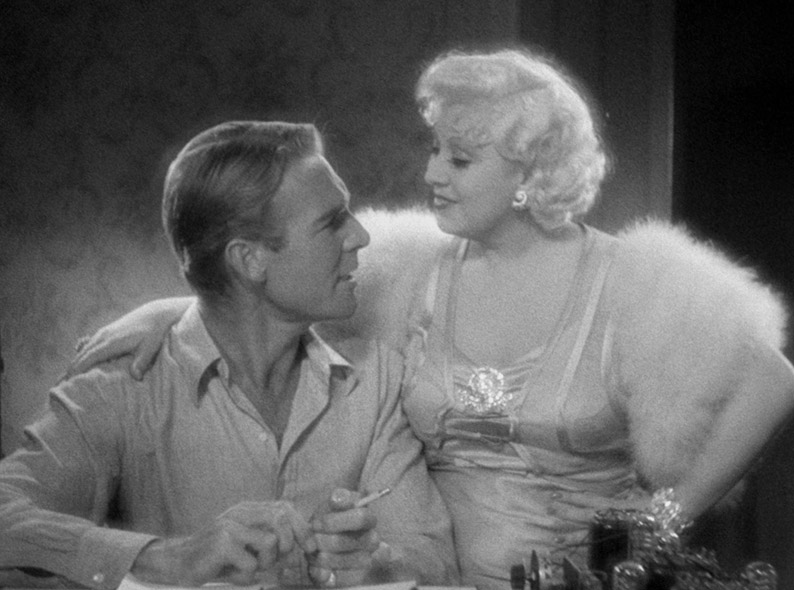
The following morning, Mavis, Morgan and Mavis’s French maid Jeanette (Alyce Ardell) are setting off for the last stop on Mavis’s nationwide tour when their car breaks down on a quiet country road. Morgan walks to a nearby boarding house, which is run by Mrs. Struthers (Alice Brady) with assistance from her daughter Joyce (Margaret Perry) and the ever-so-slightly world-weary Aunt Kate (Elizabeth Patterson). With the cantankerous Professor Herbert Rigby (Etienne Girardot) the only apparent guest, the business is being kept afloat by the next-door garage and filling station. By a quirk of chance the youngest employees of both establishments – junior mechanic Clyde (Maynard Holmes) and waitress Gladys (Isabel Jewell) – are ardent fans of Mavis Arden and were at the previous evening’s screening. With the repairs likely to take some time, Morgan books rooms for his party, which sends Clyde and Gladys into an absolute tizzy and even has Mrs. Struthers all of a flutter. The pampered Mavis is initially unhappy about the idea of staying in what she describes uncharitably as a dump, at least until she catches sight of the man who runs the garage, good-looking mechanic and wannabe inventor, Bud Norton (Randolph Scott).
For the first half of the self-reflectively titled Go West Young Man we’re in relatively new territory, with West playing almost as a parody of herself, a beloved Hollywood beauty who is a little too fond of her own image and too self-centred to give a thought for the feelings of those around her. The restrictions put on her behaviour by her producer are certainly a sound enough cause for irritation on her part, but with Morgan so easy-going and Mavis so abrasive, I found myself amused instead of frustrated when the former calls the press in to sabotage Mavis’s romantic restaurant date with Harrigan. There is also quite a spread of characters here, each of whom is allowed their comic moment in the sun, which only falls flat with the film’s single wincingly painful stereotype, slow-witted young black handyman, Nicodemus (Nick Stewart).
As is noted by Nina Fiore in her commentary track, this is essentially a screwball comedy slowed down to Mae West speed, complete with exaggerated emotions, comically skewed logic, and plot threads that collide and reroute before coming together for a hastily arrived at but tidy conclusion, one that’s subtly hinted at just twelve minutes into the film. The real surprise for me here was Randolph Scott, an actor I knew primarily for his westerns (his very name is a sacred prayer in Mel Brooks’ western parody, Blazing Saddles) but who here demonstrates a real talent for straight-faced comedy as the eager innocent who somehow fails to pick up on Mavis’s blatant come-ons. The best and most ‘Westian’ scene in the film has Mavis slowly trying to seduce Bud while he works on the plans for his invention, oblivious to her saucy dancing and not twigging what she’s up to even when she sits on his knee and puts her arm around his shoulders. When her interest in him does start to register, interruptions are always at hand, either from the scheming Morgan or the amusingly disruptive Aunt Kate. Delightfully played by Elizabeth Patterson, Kate is probably my favourite character, not least for a line that she transforms from a simple pun into low-key comedy gold with her delivery – as Morgan compliments her awareness of celebrity gossip with the observation, “Well, I can see that you aren’t exactly buried out here in the country, are you?” she replies, with a beautifully judged whiff of resignation “No, just waitin’ around to be, I guess.”
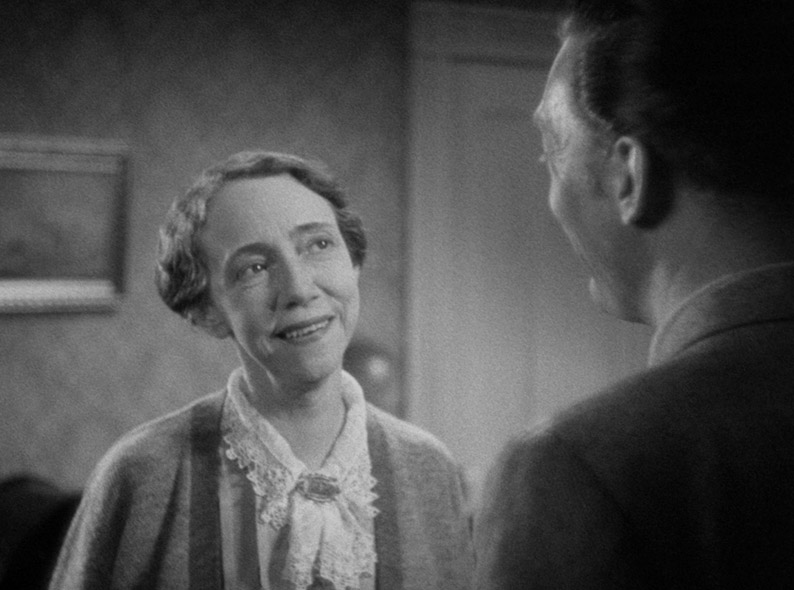
Gladys and Clyde’s screaming excitement at the prospect of Mavis visiting their home and their gushing behaviour towards her quickly wears thin, but once things settle down and Mavis takes an interest in Bud, the film really hits its stride, with nary a dull or annoying moment. We even get to see Isabel Jewell doing what would become the go-to impression of Marlene Dietrich and watch her and Elizabeth Patterson imitate Mae West’s distinctive walk. Although again written by West, this one was unusual in being adapted from a play by Lawrence Riley rather than one of West’s own creation. Just what was written by whom I’m not in a position to say, but the source material is doubtless at the root of what feels more like an ensemble piece than a vehicle for West. That said, we get a lot more of the classic West persona here than we did in Klondike Annie, particularly in her multiple attempts to seduce Bud, which include falling back into a mound of hay and clearly signalling her companion that she’d like him to join her. This time, even Bud looks like he might be starting to get the message.
| EVERY DAY’S A HOLIDAY (1937) |
|
| |
| “Why, he’s so honest I’m ashamed of myself.” |
| Peaches O’Day remarks on Captain McCarey’s integrity |
We’re in slowed-down screwball comedy territory again for a film that opens in New York on the night of New Year’s Eve in 1899 at the dawn of a new century. Here, West is Peaches O’Day, a former singer turned con woman who is a source of aggravation for corrupt police chief, Inspector John Quade (Lloyd Nolan), and who is back in town to grift yet another gullible mark by selling him the Brooklyn Bridge. Ordered to find and arrest her is the scrupulously honest Captain McCarey (Edmund Lowe, who just a whiff of young John wayne about him), who keeps cutting Peaches slack because he rather likes her, issuing warnings but always stopping short of actual arrest. Peaches, meanwhile, is planning to spend the evening with a man named Larmadou Graves (Charles Butterworth) after becoming fascinated by his new-fangled automobile, unaware that Graves works as a butler for angrily grouchy millionaire, Van Reighle Van Pelter Van Doon (Charles Winninger), who quickly becomes smitten by her beauty. The three get plastered on champagne and make plans to go out on the town, and to dress for the occasion, Peaches has the hapless Graves assist her in the robbery of an upmarket fashion store. At their chosen nightclub they are joined by Peaches’ friend Nifty Bailey (Walter Catlett), an entertainment hustler who has an idea for a big-budget musical in which Peaches will star, but to hide her in plain sight from the law she will do so in the guise of a red hot import from France known as Mademoiselle Fifi.
Come to Every Day’s a Holiday immediately after She Done Him Wrong and I’m No Angel and you’ll probably be in for a bit of a disappointment. There’s precious little of West’s signature sauciness or suggestive dialogue here, and in common with Go West Young Man, this has more of the feel of an ensemble piece. Each of the main characters is given ample introductory screen time and even their own comic moments independent of West, who again authored the screenplay. I did catch myself occasionally sniggering at this mild character comedy, despite its vaudevillian leaning and some obvious borrowing – the soda syphon that misfires into the drinker’s face is a silent movie standard, while the running gag that sees Nifty plonking advertising stickers on everything and everybody has been recycled from Howards Hawks’ 1934 pioneering screwball comedy, Twentieth Century. That said, I still laughed out loud at the sight of four beat policemen marching shoulder-to-shoulder each with stickers on their helmets, and the planting of one sticker on a sailor’s trousered buttocks had West’s sense of humour written all over it.
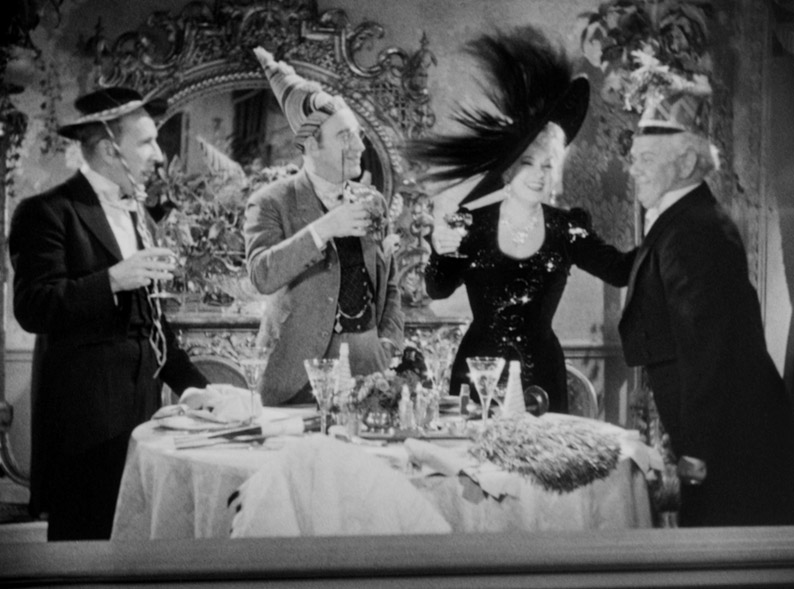
There’s certainly signs of a change in style here. West is still dressed glamorously and still the object of attraction for any man of influence within her immediate radar, but there’s a feeling that she’s testing out what for her would have been new comic ideas. The sequence in which she steals an evening dress is a good example, as she creates a human-shaped doorway through the shop window by drawing around Graves with a glass cutter, and once inside the window display, Graves repeatedly misunderstands what Peaches tells him to do, while she mutters exasperated comments under her breath. There’s even a neat sound gag when Peaches first arrives at the Van Doon mansion and puts her handbag on the table, an action that is accompanied by an alarmingly loud clunk (this is funnier than it sounds). An explanation is then forthcoming when she empties the bag out to reveal a colourful collection of handy tools, including lockpicks, a set of knuckledusters and a leather cosh.
Distanced though it may be from the characters with which she shot to fame, I still enjoyed watching West as Peaches, a likeable rogue who concludes both of her early encounters with McCarey by handing him something she has stolen from him. Her switch to Mademoiselle Fifi is amusing for a minute or so, but soon reminded me of what it is about West’s signature persona that works so well, as where Peaches is sassy, self-confident and controlled, Fifi’s loudly expressed annoyance at just about everything and everyone quickly wears thin. The supporting cast is fun, the pace is lively, West plays the drums (for real), and there’s an added bonus later in the shape some mean trumpet playing and singing from the wonderful Louis Armstrong. It’s not a great film, it’s not a top Mae West film, but I was never bored and enjoyed my time with it, and for a post-code West movie, that’ll do nicely.
| MY LITTLE CHICKADEE (1940) |
|
| |
| “’I am a good boy. I am a good man. I am a good girl’. What is this, propaganda?” |
| Flower Belle Lee reacts to a lesson she finds on a school blackboard |
The film through which I first discovered Mae West is one that only came about because some bright spark at Universal thought the studio could replicate the recent teaming of James Stewart and Marlene Dietrich in Destry Rides Again by doing likewise with two of its other hottest properties, Mae West and W.C. Fields. Both stars by this point had become associated with specific characters, West as the hot, suggestive, man-hungry blonde bombshell, Fields as a luckless and heavy-drinking misanthrope with a contemplative drawl, and both had fan bases of considerable size. The supposition was clearly that by appealing to both camps, the studio could really clean up on this one. Turns out, it was right, as the film made back almost four times its budget. It was certainly popular, but how does it fly as a vehicle for West?
Here, she plays the glamorous Flower Bell Lee, and we get to meet her just eight seconds after the titles fade, without any of the usual anticipatory build-up, as she rides in a stagecoach, filing her nails while being gawked at by three moustachioed male passengers and flashed disapproving looks by the woman seated beside her. The woman in question is the town gossip, Mrs. Gideon, and she’s played by Margaret Hamilton, whose most famous role was as the Wicked Witch of the West in The Wizard of Oz but who was also a master of looking put out and morally disgusted by others. The coach is held up by the notorious Masked Bandit, who hides his face and speaks with the sort of exaggerated foreign accent that just has to be put on to disguise his true voice. He steals the stagecoach’s gold shipment and kidnaps Flower Belle, who in the film’s second venture into new territory is revealed to have been heading home to her family. They immediately start fretting at the news of her abduction, but a short while later are relieved when she arrives back safely, carefully deflecting any discussion about what happened in the meantime. It soon becomes clear that she and the Masked Bandit got on rather well, so well, in fact, that he climbs up to her bedroom to visit her that night and grab another kiss. Unfortunately, he’s spotted leaving by Mrs. Gideon, who, in a hastily called trial, claims that Flower Belle is in cahoots with the bandit. This results in Flower Belle being told to leave town and not return until she is "respectable and married." I’ll just pause for breath there, as by this point we’re only eight minutes in to an 83 minute film.
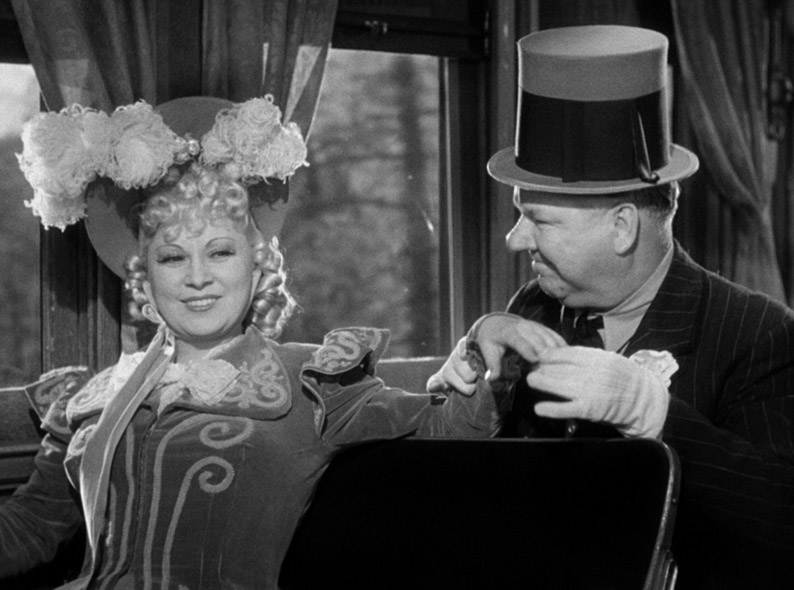
On the train to her new home town of Greasewood City, Flower Belle shares a carriage with professional gambler Mr. Budge (Donald Meek, a master at playing put-upon characters but who gets the rare chance to play a more confident one here), the new sheriff of Greasewood (played by insanely prolific director George Melford), and the aforementioned Mrs. Gideon, who is planning to meet up with the worryingly named Greasewood Ladies Vigilante Committee and keep a sharp eye on Flower Belle. On the way, the train is stopped by Cuthbert J. Twillie (W. C. Fields), who is immediately attracted to Flower Belle, and while she is initially uninterested in him, she soon changes her tune when notices that his suitcase is crammed with banknotes. The train is attacked by a Native American war party, many of whom Flower Bell shoots with unerring accuracy whilst Cuthbert bumbles around providing no help to anyone. After the battle, the opportunistic Flower Belle agrees to marry Cuthbert, a ceremony she persuades Budge to carry out because everyone else in the carriage just assumes that he’s a preacher. Once they arrive in Greasewood and get separate hotel rooms, Flower Belle entrances both local saloon owner and unofficial town boss, Jeff Badger (Joseph Calleia), and newspaper editor Wayne Carter (Dick Foran), who seem to really have it in for each other. After being saved from ejection by Flower Belle for cheating at gambling, Cuthbert enjoys the hospitality of the house, and while bragging that it was he who shot all of the Indian raiders, he’s made town sheriff, the original candidate having been killed on the train.
As is probably evident from the above setup summary, there’s a little more plot in My Little Chickadee than is usual for a Mae West movie, and while most of the seemingly disparate elements do later connect to each other in some way, the overall trajectory turns out to be a by now familiar one. The clash of the two comedy styles feels a little awkward at first, but once the train reaches Greasewood, the combination of Fields’ bumbling eagerness to get into his (fake) wife’s room and West’s cool rebuffs and attraction to other men proves to be an entertaining combination. In their solo scenes, it’s easy to sympathise with the view that this feels more like two sperate movies that have been stapled together, the result, apparently, of the two stars being given free rein to write their own scenes and dialogue, which then had to be shaped into a single movie (West always maintained that she wrote the whole film except for a single scene for which Fields demanded co-screenwriting credit). Both get the chance to individually shine here, notably when Flower Belle agrees to teach a class of young male rascals (and one educationally flagging adult), and again when Cuthbert briefly tends bar and has to deal with a loud female drunk, a scene that includes a superb sight gag involving the unseen entrance to the bar cellar.
There’s a little more of the West of legend on display here than in Every Day’s a Holiday, and there are certainly more of her signature lines, although nothing as overtly suggestive as the plum ones from her early films. Fields is also on typically amusing form, despite the stories that he was drinking heavily enough by this point for it to sometimes interfere with his reliability and trigger a rumoured early departure from the production. Word has it that much of the material was still heavily censored by the Hays Office goons, whose sticky fingers can be most clearly spotted on the sham marriage of Flower Belle and Cuthbert, where what few words of the supposedly sacred ceremony that are uttered drowned by the deafening blast of a train whistle.
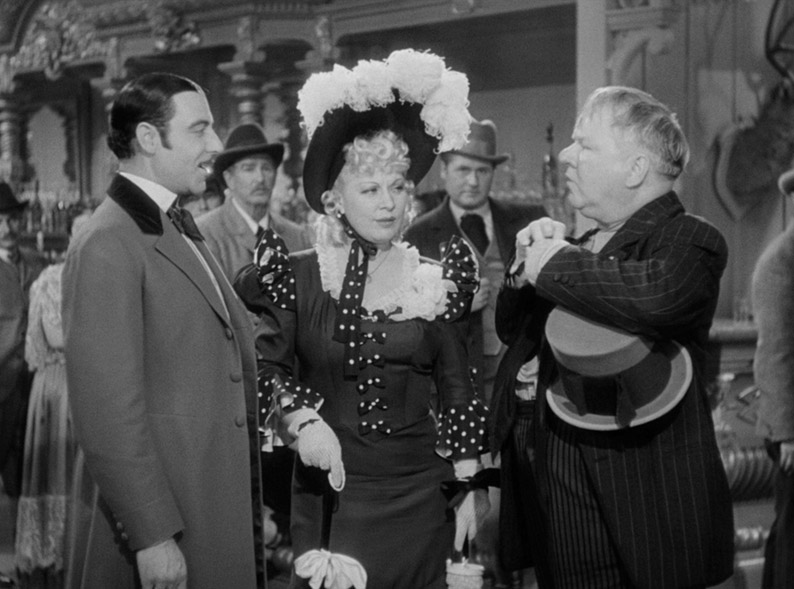
The apparent gluing together of what was essentially two scripts also raises a couple of questions that do not get answered, particularly around Greasewood’s peculiarly high turnover of sheriffs, which is strongly hinted to be the result of unspecified criminal activity on Jeff Badger’s part. And while we have no stereotypical black characters this time around, you will have to make allowances for Cuthbert’s Native American companion, whose dialogue consists of saying “Ugh” or things like, “Big Chief gottum new squaw?” My Little Chickadee is still a lot of fun, not vintage West or Fields by any means, but an enjoyable if relatively safe introduction to both, and a film that works rather well an appetiser for the main course of their more masterful earlier work.
| |
| “If you want things put in order, come and see me, south of the border.” |
| Fay Lawrence sings about tropical climes |
And this is how it ends. Not completely, of course, but The Heat’s On effectively brought Mae West’s movie career to a close, at least until her appearance in the critically mauled Myra Breckenridge in 1970. The Heat’s On is apparently not a film that West wanted to make but that she was persuaded to appear in by its director, Gregory Ratoff, a former actor who played a key role in I’m No Angel and had remained friends with the star. And when I say, ‘appear in’, I mean that in its usually accepted sense when it comes to movies. West may get star billing, but she’s essentially a supporting player here, and during the first 50 minutes of this 79-minute movie, she’s only on screen for about eight of them.
The plot? Oh, if I must. Indiscretions, the latest lavish stage musical from producer Tony Ferris (William Gaxton), is not doing well. Adding to Tony’s woe is that his biggest draw, singer Fay Lawrence (Mae West), has been offered a plum role in a new production titled Tropicana by Tony’s main rival, Forrest Stanton (Alan Dinehart), and has found a loophole in her contract that will allow her to accept it. The despairing Ferris is then paid a visit by Hubert Bainbridge (Victor Moore) of the Bainbridge Foundation, an uptight moralist organisation with the power to censure and even censor productions. It turns out that he’s not come as a Foundation representative but to tell Tony how much he enjoyed the show and ask him if there might be a part in it for his talented and stage-struck niece, Janey (Mary Roche). Initially dismissing Hubert as a pest, Tony then has an idea to increase interest in the show by having the Bainbridge Foundation lodge a complaint that triggers a police raid, a plan that he initiates by having Hubert sell the idea to his domineering and morally uptight sister, Hannah (Almira Sessions). It backfires, however, when Hannah is so outraged by photographs Hubert shows her of Fay that she has the show shut down, by when Fay has already jumped ship. A desperate Tony then begins looking for a way to take control of Tropicana and bring Fay back into the fold.
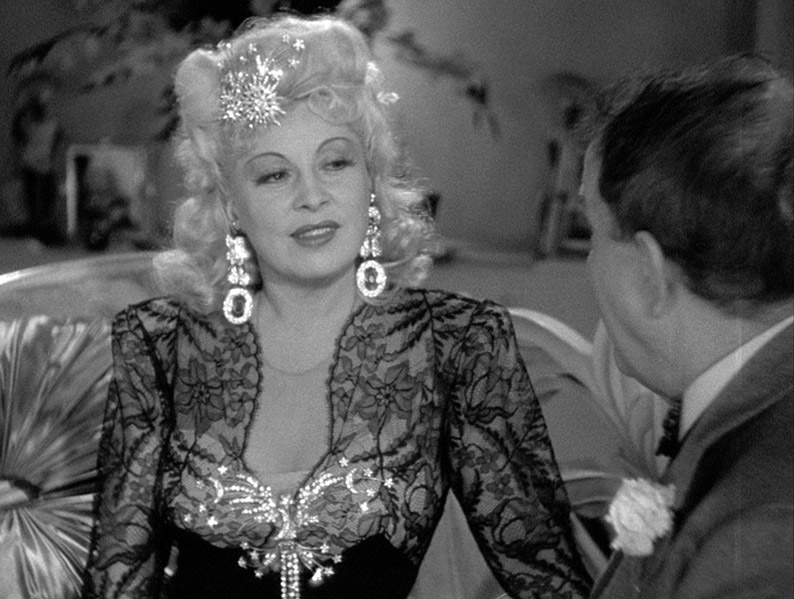
I’ll be honest and admit that I had to re-watch whole sections of The Heat’s On to clarify exactly what Tony is doing to who and why. A professional grifter with a dubious moral code, he scares his rival into selling him control of Tropicana at a bargain price, then flimflams Hubert into funding the production from the Bainbridge Foundation cash reserves, without a care for the ultimate fate of either. In the end it matters little, as this is all filler to move us from one musical number to the next, and if you think that’s where West gets her moments in the spotlight, think again. She’s central to the opening tune, a generic stage musical number that has none of the bluesy edge of the tunes for which she became famous, but is then off the stage until the finale, when she only gets to deliver the tail end of a song. In between, we are treated to a whole string of numbers that are ostensibly from the Tropicana stage musical, even though one of them could not possibly have been performed on the stage we see. Most of them have a strong calypso leaning, the best of them performed by the brilliant singer-pianist, Hazel Scott, who in just two numbers not only steals the show but the film itself, which should give some idea of the imbalance at work here.
Eventually, West does get to revisit her classic persona, but in a scene where she has to play second fiddle to Victor Moore’s gooning around as a drunken Hubert, who also delivers the film’s most painfully off-tune song. Then again, for the first time since she entered the movies, West is delivering someone else’s dialogue, and try though screenwriters Fitzroy Davis, George S. George and Fred Schiller might, they just can’t write sassy one liners for her that are even close to the quality of the ones that she could write herself. The sly digs at the Hays Office censoring of West’s past productions (the Bainbridge Foundation? Do me a favour) and a couple of the musical numbers aside – and the film is worth seeing for Hazel Scott performing simultaneously on two pianos alone – I found this a real slog, and a rather sad end to West’s run as a Hollywood Queen.
<<previous | next >>
The Films (Part 1) | Tech Specs, Special Features and Summary
|